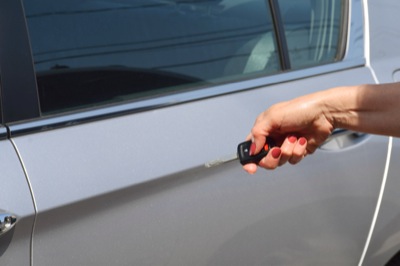Friday, July 13th, 2018
Kitchen item can prevent car thefts by hackers
By Tom Stankard

Photo by Tom Stankard/The Daily Standard
Hackers are using specialized equipment to amplify the signals used between key fobs and vehicles. The devices allow them to open and potentially start vehicles equipped with keyless entry and remote-start technology.
Hackers continue to find ways around security features as technology improves, and vehicles are their latest target.
Technologically savvy people wanting to gain access to others' cars have learned how to copy signals emitted between key fobs and their vehicles. However, car owners can prevent this type of theft by using a common kitchen item, Holly Hubert, a former FBI special agent and CEO of Global SecurityIQ, told the newspaper.
Vehicles and fobs communicate through low-power radio signals that are effective only when the fob is close to the car door or ignition start/stop button, Hubert said. Thieves can use special equipment to amplify and transmit the signal and trick the car into thinking the fob is next to its door, which allows the vehicle to be unlocked and started.
This process is called a relay attack, AAA stated in a news release. During an attack, thieves use a receiver/amplifier box to acquire the signal from a car's keyless entry/ignition fob. The signal is then transmitted to a relay box an accomplices holds next to the vehicle to unlock the doors and even start the car.
Hubert said simply wrapping a fob in aluminum foil will shield the signal and keep thieves at bay. The foil should be replaced regularly, however, because it deteriorates with repeated wrapping and rewrapping, AAA's news release warned.
Another option for protecting a car's signal is to purchase a Faraday bag, which Hubert said is more practical for everyday use and provides the same protection.
AAA reported that placing the key fob in a broken, unplugged microwave while at home also will block the signal.
Mercer County Sheriff Jeff Grey said these were good ideas but recommended people take additional measures to protect their cars from theft.
Relay attacks tend to involve property theft from inside vehicles, not the cars themselves, according to AAA's release. Grey said owners should regularly clean out their vehicles and keep any potentially targeted items out of site.
"Everybody throws coins and stuff into their center console. That attracts thieves to break in and rummage through," he said. "With the drug problem, people are trying to take $2 from this car and $3 from that car."
If people do have to leave something of value in their vehicles, he recommends they keep it in their trunk or somewhere else where people won't see it.
Grey said deputies haven't yet received reports of thieves copying codes to break into vehicles. He noted trends like this usually start in big cities and spread from there.
Relay attacks use the vehicle's regular access process, so no evidence of tampering is left, according to AAA's release. The radio signals received by the car are from its own fob, so no alarms are activated.
If hackers can already copy codes to break into vehicles, Grey said he's worried they could do worse.
"One problem with cars nowadays is they are computer powered. You just wonder if someone will be able to hack into your car and take control," he said.
Grey and Hubert both said they hope automakers can soon figure out a way to protect fob codes and prevent hacking.
Wade Newton, senior director of communication for Alliance of Automobile Manufacturers, wrote in an email that automakers have been working on multiple fronts to address the security of their products.
"Some automakers may include a series of redundant systems and mechanisms as one approach to enhancing vehicle security," he wrote. "Protecting vehicle access and security continue to be top priorities for this industry."



